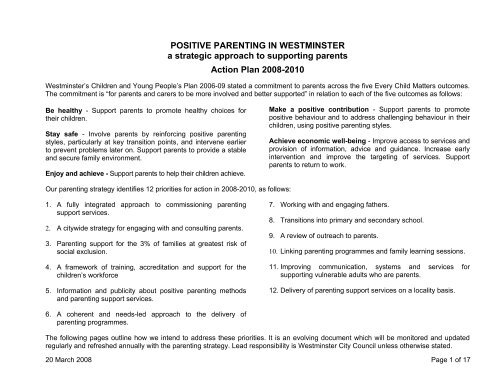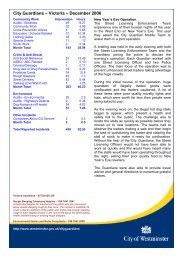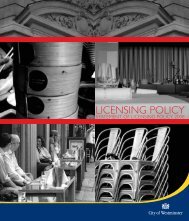Parenting Strategy Action Plan.pdf - Westminster City Council
Parenting Strategy Action Plan.pdf - Westminster City Council
Parenting Strategy Action Plan.pdf - Westminster City Council
- No tags were found...
Create successful ePaper yourself
Turn your PDF publications into a flip-book with our unique Google optimized e-Paper software.
POSITIVE PARENTING IN WESTMINSTERa strategic approach to supporting parents<strong>Action</strong> <strong>Plan</strong> 2008-2010<strong>Westminster</strong>’s Children and Young People’s <strong>Plan</strong> 2006-09 stated a commitment to parents across the five Every Child Matters outcomes.The commitment is “for parents and carers to be more involved and better supported” in relation to each of the five outcomes as follows:Be healthy - Support parents to promote healthy choices fortheir children.Stay safe - Involve parents by reinforcing positive parentingstyles, particularly at key transition points, and intervene earlierto prevent problems later on. Support parents to provide a stableand secure family environment.Enjoy and achieve - Support parents to help their children achieve.Make a positive contribution - Support parents to promotepositive behaviour and to address challenging behaviour in theirchildren, using positive parenting styles.Achieve economic well-being - Improve access to services andprovision of information, advice and guidance. Increase earlyintervention and improve the targeting of services. Supportparents to return to work.Our parenting strategy identifies 12 priorities for action in 2008-2010, as follows:1. A fully integrated approach to commissioning parentingsupport services.2. A citywide strategy for engaging with and consulting parents.3. <strong>Parenting</strong> support for the 3% of families at greatest risk ofsocial exclusion.4. A framework of training, accreditation and support for thechildren’s workforce5. Information and publicity about positive parenting methodsand parenting support services.7. Working with and engaging fathers.8. Transitions into primary and secondary school.9. A review of outreach to parents.10. Linking parenting programmes and family learning sessions.11. Improving communication, systems and services forsupporting vulnerable adults who are parents.12. Delivery of parenting support services on a locality basis.6. A coherent and needs-led approach to the delivery ofparenting programmes.The following pages outline how we intend to address these priorities. It is an evolving document which will be monitored and updatedregularly and refreshed annually with the parenting strategy. Lead responsibility is <strong>Westminster</strong> <strong>City</strong> <strong>Council</strong> unless otherwise stated.20 March 2008 Page 1 of 17
POSITIVE PARENTING IN WESTMINSTER PARENTING SUPPORT ACTION PLAN 2008-101. COMMISSIONINGStrategic Priority:<strong>Parenting</strong> Offer: Levels 1 - 4Desired outcomes:A fully integrated approach to commissioning parenting support services.1. Elimination of duplication and gaps in services.2. Increasingly needs-led and effective commissioning.3. Best value from available resources.<strong>Action</strong> Lead Resp. Key Partners Timescale(by)1. Mainstream single <strong>Parenting</strong>Commissioner post.2. Identify funding sources to supportparenting agenda 2008-09.3. Joint comprehensive needs analysis toinform needs-led planning andcommissioning beyond 2008-09.4. Establish mechanisms for jointcommissioning across city boundariesto address mobility issues.5. Capacity-build voluntary andcommunity organisations to offer highquality parenting support services,including Triple P parenting programs.6. Commission Triple P provider trainingcourses and materials.Funding Progress / CommentsMike Potter David Hawker Aug 2008 TBA Interim arrangement in place.<strong>Parenting</strong>Commissioner<strong>Parenting</strong>Commissioner<strong>Parenting</strong>Commissioner<strong>Parenting</strong>Commissioner<strong>Parenting</strong>CommissionerMike Potter,MichaelO’ConnorWCC and PCTcommissionersKiran Hayer,Jayne Vertkin,Helen Matthes,Liz LongOngoing NA Outcome of DCSF Youth Task Force andFamily Pathfinder bid awaited. 3% of familiesat risk are a One <strong>City</strong> priority.June 2008 NA Finance review, children’s trust and jointstrategic needs analysis (JSNA) with PCTshould facilitate this.2008-09 NA Eg Staff have attended Triple P providertraining in 3 boroughs (Hillingdon, Fulhamand Newham) and vice versa.VAW 2008-09 TBA NCH SLA to include delivery of Triple Pprograms in 2008-09.Capacity building to be discussed May 2008.Jayne Vertkin,Trevor Moores,Eamon Brennan2008-10 TBA One <strong>City</strong> budget £100k over 2 years.Ongoing funding will be required.Updated 21 April 2008 2
POSITIVE PARENTING IN WESTMINSTER PARENTING SUPPORT ACTION PLAN 2008-102. CONSULTING PARENTSStrategic Priority:<strong>Parenting</strong> Offer: Levels 1 - 4Desired outcomes:A citywide strategy for engaging with and consulting parents1. Parents are consulted about their needs through formal and informal mechanisms.2. Parents are involved in the planning, development and delivery of services.3. Parents are asked for feedback on services and strategy and their views are taken into account in future developments.<strong>Action</strong> Lead Resp. Key Partners Timescale(by)1. Map existing parenting groups andforums.2. Review findings from Parents on<strong>Parenting</strong> consultation exercise, March2008 and consider implications.3. Develop and implement parentconsultation strategy. Possibilities:a. Increased use of <strong>City</strong> Survey,Quarterly Tracker, Children Firstnewsletter and online media.b. Framework of Parent Forums atdifferent levels – schools, children’scentres; hubs, localities, city.c. Annual Parents on <strong>Parenting</strong>surveyd. Parent Voice – annual ‘meet theparents’ event where parent forummembers can meet with Children’sTrust members and senior officers.e. Arrangements to ensure parents inhard to reach groups are included,eg of children with disabilitiesf. Continue to tap into existing groupsg. Contine to monitor national surveysAnn-MarieSmith<strong>Parenting</strong>Commissioner<strong>Parenting</strong>CommissionerFunding Progress / Comments<strong>Parenting</strong> leads. Ongoing NA In progress<strong>Parenting</strong><strong>Strategy</strong> Group,Neil Wholey<strong>Parenting</strong> leadsin each service /agency.Neil WholeyMay 2008 NANAThe 2008 Parents on <strong>Parenting</strong> Survey willset baseline measures, influence theparenting strategy refresh, and feed into aParent Voice event. Repeating the surveyannually will enable progress to bemeasured.Updated 21 April 2008 3
POSITIVE PARENTING IN WESTMINSTER PARENTING SUPPORT ACTION PLAN 2008-103. FAMILIES AT RISK (3%)Strategic Priority:<strong>Parenting</strong> Offer: Level 3-4Desired outcomes:<strong>Parenting</strong> support for the 3% of families at greatest risk of social exclusion.1. Referral to parenting programmes and support is included in robust multi-agency plans for the whole family, coordinated via alead professional.2. There are clear processes for accessing parenting programmes.3. Evidence-based group and individualised parenting programmes run all year round in local areas and settings across<strong>Westminster</strong>, and at varying times so parents can access advice and guidance when and where they need it.4. Enhanced, individualised parenting interventions e.g. on coping with stress, managing anger, partner support and managingfamily transitions are offered to families in difficult circumstances, including where a child has severe social, emotional orbehavioural difficulties, where there is a history of crime, anti-social behaviour or domestic violence, and where there is risk ofabuse or breakdown.5. <strong>Parenting</strong> programmes are offered to parents whose children have been looked after by the <strong>City</strong> <strong>Council</strong> where the plan is forthem to return home, with similar training for foster and respite carers.<strong>Action</strong> Lead Resp. Key Partners Timescale(by)1. Recruit into vacant parentingpractitioner posts.2. Referrals of 3% parents for parentingprograms (individual or group) arerouted via the Senior <strong>Parenting</strong>Practitioner Kiran Hayer.3. Senior <strong>Parenting</strong> Practitioner sets upmechanisms with partner agencies toensure enough parenting programmesto meet the needs of the 3% parents.4. Pilot Family Assessment andIntervention Team in North localityincludes a <strong>Parenting</strong> Practitioner.5. Pilot delivery of Standard Triple P byNCH family support workers in Centraland North localities. Evaluate.6. Pilot delivery of Enhanced andPathways Triple P. EvaluateEamonBrennanMatt Watson All referrers Ongoing NAKiran HayerTriple P partneragencies,childrens centresJames Thomas Eamon Brennan December2008Trevor Moores NCH From May2008<strong>Parenting</strong>CommissionerNCHFunding Progress / CommentsJune 2008 TBC DCSF funding for parenting experts due toincrease to £100K bringing parenting team to4 parenting practitioners including 1 senior.Ongoing NA Triple P partners to date: YOT, NCHMarylands, Befriend A Family, CAMHSPaddington Green, Children’s Centres.Latter also run Mellow <strong>Parenting</strong> for 0-5’s.2nd half of2008-09Updated 21 April 2008 4NANAOne <strong>City</strong> priority. Family Pathfinder bidoutcome awaited. See ‘<strong>Parenting</strong>Programmes’.NA NCH workers trained in Standard Triple P.Also see ‘Commissioning’.
POSITIVE PARENTING IN WESTMINSTER PARENTING SUPPORT ACTION PLAN 2008-104. CHILDREN’S WORKFORCEStrategic Priority:<strong>Parenting</strong> Offer: Levels 1 – 4Desired outcomes:A framework of training, accreditation and support for the children’s workforce.1. All staff in contact with parents have basic knowledge about positive parenting methods and the parenting support available.2. Staff in the children’s workforce who work directly with parents have the required generic skills and competencies in workingwith parents and meet national occupational standards for work with parents and other qualifications as appropriate.3. Practitioners are trained, accredited and supported to deliver robustly-evaluated, evidence-based parenting programmes, suchas Triple P, and maintain their skills through practice, peer support and supervision.4. Parents receive high standards of service that promote positive outcomes for their children and themselves.<strong>Action</strong> Lead Resp. Key Partners Timescale(by)1. Maintain staff training database inrelation to parenting training.2. Extend induction training for children’scentre staff to include basic informationabout parenting programmes and howparents may access them.3. Commission training for expandedChildren’s Information Service staff toenable them to steer parents toappropriate sources of advice.4. Include information on referring toparenting programmes in CAF training.5. Identify a parenting lead practitioner ineach agency/service and establishnetwork of lead practitioners.6. Commission top-up training in genericskills and competencies for youthjustice workers, social workers andhealth visitors in the children’sworkforce.Helen MatthesJayne VertkinDearbhalaGiffinKim Leathem<strong>Parenting</strong>Commissioner<strong>Parenting</strong>Commissioner<strong>Parenting</strong>Commissioner,Jayne Vertkin,Kiran Hayer<strong>Parenting</strong>Commissioner<strong>Parenting</strong>commissionerJayne Vertkin<strong>Parenting</strong>Commissioner<strong>Parenting</strong> leadsin each serviceFunding Progress / CommentsApril 2008 NA Databases in process of being combined.2008-09 NA Also see ‘Information and Publicity’.May 2008 NA As suggested in Duty to provide information,advice and assistance guidance.2008-09 NA Referrers need not use a CAF to refer aparent, but such a referral can be made via aCAF if services for a child are also needed.2008-09 NAHelen Matthes 08-09 TBA NAPP are piloting training for these 3professional groups. The senior parentingpractitioner (YOT) is due to take part.Updated 21 April 2008 5
POSITIVE PARENTING IN WESTMINSTER PARENTING SUPPORT ACTION PLAN 2008-107. Build capacity to offer a rollingprogramme of generic Working withParents training locally linked to NVQs.8. Manage organisation of staff training, ieapplications for places, for Work withParents, parenting programmes, etc9. Mainstream peer support for staffdelivering Triple P and other parentingprogrammes.10. Mainstream awareness training inworking with fathers into mandatorytraining for the children’s workforce.11. Joint planning of staff training betweenWCC and PCT on an annual basis.12. Train practitioners in Adult Services inwork with parents to level 1/2 to ensurevulnerable adult parents can besupported. Train a few key practitionersin level 3 to provide a comprehensiveworkforce across both areas.Ros MillamHelen Matthes<strong>Parenting</strong>Commissioner<strong>Parenting</strong>Commissioner<strong>Parenting</strong> leadpractitionersKiran Hayer,Becky Daw2009-10 TBA NAPP is reviewing the content of the coretraining and costs not yet available.2008-10 NA2008-09 NA This is necessary if practitioners are tomaintain and enhance their skills.Ros King Trefor Lloyd 2009-10 TBA Training needs analysis will be required.Also see ‘Fathers’<strong>Parenting</strong>Commissioner<strong>Parenting</strong>CommissionerHelen Matthes<strong>Parenting</strong> leadsAnnually inNovemberNASelina Douglas 2008-09 TBA To be discussed. See 11. Vulnerable AdultsUpdated 21 April 2008 6
POSITIVE PARENTING IN WESTMINSTER PARENTING SUPPORT ACTION PLAN 2008-105. INFORMATION AND PUBLICITYStrategic Priority:<strong>Parenting</strong> Offer: Levels 1 - 3Desired outcomes:Information and publicity1. Information about positive parenting methods is publicised, promoted and widely available in different media and formats,online, and in a choice of locations visited by parents including libraries, children’s centres, doctors’ surgeries and schools.2. Accurate information about parenting support services and how to access them, is held centrally, updated regularly andpublicised online and locally in accessible formats.3. Information for parents is accessible, good quality, appropriate and up to date.4. When parents need information they know where to find it and they receive an appropriate, timely and helpful response.5. There are clear processes for accessing parenting programmes.<strong>Action</strong> Lead Resp. Key Partners Timescale(by)1. Extend the Children’s InformationService to include parenting supportservices for parents of 0-19.2. Include information about agenciesproviding parenting programmes in theWISH Directory.3. Schedule of parenting programmesrunning in <strong>Westminster</strong> is maintainedand communicated to extendedChildren’s Information Service on aregular basis.4. Review of parenting resources in keylocations, including children’s centres,schools, libraries, doctors’ surgeries.Create recommended list of parentingresources.5. Develop guidance leaflet forprofessionals (2 sided A4) explainingwhen and how to refer parents toparenting programmes. Publish anddistribute widely to include YISPs andFSPs.DearbhalaGiffinKim LeathemKiran Hayer<strong>Parenting</strong>CommissionerChristineReeves<strong>Parenting</strong>CommissionerKiran Hayer andrelevantagenciesJanese SamuelsTriple P partners,Jayne Vertkin,childrenscentres, schoolsJayne Vertkin &identified lead foreach service<strong>Parenting</strong>CommissionerJayne Vertkin,Kim Leathem,Funding Progress / CommentsApril 2008 TBA In line with new Information Duty. Link tonational Parent Know-How site whenlaunched.April 2008 NA Vertex support officer would add informationto the directory.AnnuallyandupdatedmonthlyNA2008-09 £4000 Recommended list to include Triple P tipsheets, parent handbooks and DVDs.May 2008 NA Similar format to the CAMHS leaflet.Updated 21 April 2008 7
POSITIVE PARENTING IN WESTMINSTER PARENTING SUPPORT ACTION PLAN 2008-106. Commission parenting support servicesguide for practitioners in front lineservices and intake teams.<strong>Parenting</strong>CommissionerMay 2008 Draw on good practice from elsewhere.7. Entry about parenting services in nextissue of ‘A simple guide to what youpay and an A-Z of what you get’.Extend entry for CIS to 0-19s andparenting support.<strong>Parenting</strong>CommissionerCommunicationsWhen nextupdatedNA8. Develop parenting offer leaflet forparents.<strong>Parenting</strong>Commissioner9. Launch parenting strategy <strong>Parenting</strong>Commissioner10. Media strategy to raise awareness ofpositive parenting and address parents’common concerns. Possibilities:• Articles in <strong>Westminster</strong>’s ‘ParentsFirst quarterly newsletter• Columns/articles in local media• Input to parents’ newsletters andnotice boards in schools<strong>Parenting</strong>CommissionerCommunications May 2008 TBA Distribute via Transition InformationSessions in schools in September 2008Communications TBA NA<strong>Parenting</strong> leadsAsappropriateNAUpdated 21 April 2008 8
POSITIVE PARENTING IN WESTMINSTER PARENTING SUPPORT ACTION PLAN 2008-106. PARENTING PROGRAMMESStrategic Priority:<strong>Parenting</strong> Offer: Levels 2 - 4Desired outcomes:Coherent and needs-led approach to the delivery of evidence-based parenting programmes.1. Practitioners respond to parents’ needs for support with parenting through brief consultations, topic-based group sessions andstructured parenting programmes in children’s centres, extended schools and community settings.2. Health visitors and other early years practitioners provide advice and support with relationship difficulties in early parenthood.3. <strong>Parenting</strong> programmes are available to help parents of adolescents respond effectively to problematic and risky behaviourassociated with drugs, alcohol, sexual behaviour, bullying and truanting.4. Specialised interventions are available for young parents, and parents of children with disabilities or physical illness.5. Parents can access advice and guidance when and where they need it.6. Parents report improved parenting capacity.7. Increased parental access to and uptake of parenting support services.8. Improved school attendance and behaviour.<strong>Action</strong> Lead Resp. Key Partners Timescale Funding Progress / Comments1. Pilot delivery of Triple P Primary Carebrief interventions in children’s centres.Evaluate and review.2. Pilot delivery of Triple P Groupprograms in children’s centres.Evaluate.3. Provide group and individual Triple Pprograms to parents of children withbehavioural problems referred by YOT,YISP, schools, RSLs, etc. Evaluate.4. Pilot delivery of individual and groupTriple P programs to parents of tier 3referrals to Paddington Green CAMHS.Evaluate.5. Pilot Triple P Stepping Stones forparents of children with disabilities.Evaluate.Jayne VertkinJayne VertkinKiran HayerTami KramerSarah Bedford,CAMHS PG.Children’scentresHelen Matthes,Liz Long, WPCTChildren centres<strong>Parenting</strong>practitionersTriple P partnersReferringagenciesCollege ParkFrom June2008FromJanuary2009NANABaseline parenting programme. Training inApril with accreditation in June. Potentialparticipants in Central cluster identified.1 practitioner trained. Group due to startshortly. Further training under discussion.Ongoing NA Practitioners trained in Group, Group Teen,Standard, Enhanced & Pathways programs.Group and Group Teen programs running ona regular basis. Also see ‘Outreach’From June2008From June2008NANAPractitioners trained in Group, Group Teen,Standard, Enhanced & Pathways programs.<strong>Plan</strong>ning for group delivery is in hand.Practitioner trained. <strong>Plan</strong> to run SteppingStones groups at College Park School. Alsopossibility of training for staff at RainbowCentre. Also see Vulnerable Adults.Updated 21 April 2008 9
POSITIVE PARENTING IN WESTMINSTER PARENTING SUPPORT ACTION PLAN 2008-106. Pilot delivery of Standard Triple P forreferred families in North and Centrallocalities. Evaluate7. Pilot delivery of Triple P by key staff inschools eg SHS/PSAs. Evaluate.8. Consider inclusion of Triple P Group/Group Teen programs in foster carertraining.9. Provide Mellow <strong>Parenting</strong> and PEEPparenting programmes for carefullytargeted groups of parents of 0-5’s inchildren’s centres. Evaluate.10. Adapt Triple P courses and materialsas necessary to meet the needs of non-English speakers.11. Consider the implications of homelanguage demographics and developmechanisms to increase access toparenting programmes via schools bynon-English speaking parents.12. Commission training in BriefEncounters relationship counsellingbrief interventions for delivery bypractitioners in children’s centres.13. Review and if necessary reshapepattern of delivery of structuredparenting programmes.Trevor MooresPauline BastickJanine RoweJayne VertkinNCH, KiranHayer, JamesThomasSchools inCentral cluster<strong>Parenting</strong>CommissionerHelen MatthesVon McClareyChildren’scentresFrom June2008NATraining in April, accreditation in June.2009-10 TBD For discussion. Also see ‘Outreach toParents’.2008-09 TBD For discussion.2008-09 NA Practitioners trained in each cluster. Groupsstarted March 2008. Evaluationcommissioned.Kiran Hayer Jayne Vertkin 2008-09 NA Work with other boroughs on this. GOL tocreate network of Triple P boroughs.<strong>Parenting</strong>CommissionerLiz Long,<strong>Westminster</strong>PCT<strong>Parenting</strong>CommissionerPauline Bastick,Matt WatsonJayne Vertkin,childrens centres2008-09 TBA Arabic, Bengali/Sylheti, Albanian and Kurdishare the 4 home languages most commonlyspoken at home by parents of primary schoolpupils in <strong>Westminster</strong>.Ongoing TBA Some practitioners trained.Commissioners 2009-10 Based on learning and evaluation 2008-09.Updated 21 April 2008 10
POSITIVE PARENTING IN WESTMINSTER PARENTING SUPPORT ACTION PLAN 2008-107. FATHERSStrategic Priority:Work with fathers.<strong>Parenting</strong> Offer: Levels 1 - 4Desired outcomes:1. Professionals understand the needs of fathers, including teenage fathers. They are skilled in engaging and in working withfathers. They know what support is available and can refer swiftly and appropriately.2. Increased awareness by fathers of the importance of their active, positive involvement in their children’s lives.3. Increased involvement of fathers and enhanced parenting capacity.4. Increased positive engagement of fathers with their children and their children’s mothers.<strong>Action</strong> Lead Resp. Key Partners Timescale(by)1. Identify ‘fathers leads’ for each serviceand establish working group.2. Address the needs of fathers. Keyaction points:a) Identify fathers through existingnetworks – Connexions, YOT, etcb) Source/develop information packfor fathers/expectant fathersc) Develop specific support for fathersd) Specialist organisations like WWMto promote relevant servicee) Offer training to workers ondeveloping good practice aroundworking with fathersf) Review TP agenda in order to drawattention to fathers’ agenda too3. Evaluate impact of fathers’ projects inchildren’s centres.4. Briefings for school staff about fathers’involvement and targeting specificgroups of fathers eg non-resident, BME<strong>Parenting</strong>CommissionerNorah O’Brien,TeenagePregnancyCoordinatorTrefor LloydShaff PrabataniNorah O’BrienLabibun NessaSupportingYoung ParentsGroupWorking WithMenApril 2008 NALabibun Nessa CC staff 2008-09 NATBAWorking WithMen, schoolsOngoingFunding Progress / CommentsDCSFGrant<strong>Action</strong>s identified at a Teenage Pregnancyconference in <strong>Westminster</strong> in 2007.Training has been provided to someworkers.As part of Fathers and Schools DevelopmentWorkers project funded by Youth Task Forceparenting grant.Updated 21 April 2008 11
POSITIVE PARENTING IN WESTMINSTER PARENTING SUPPORT ACTION PLAN 2008-105. Evaluate fathers’ initiatives in schools,and disseminate report to primaryschools in <strong>Westminster</strong> and elsewhere.Trefor Lloyd(WWM)<strong>Parenting</strong>CommissionerSeptember2008NAProject funded by Youth Task Force<strong>Parenting</strong> Grant until September 2008.6. Benchmark children’s centres and othersettings against key standards forworking with and engaging fathers.Report and recommendations.TBAJayne Vertkin,children’scentres2 nd half of2008-09NAFor discussion.7. Roll out briefings for professionals onworking with fathers.TBA See Workforce.8. Pilot delivery of Triple P Group or shortcourse for fathers in children’s centres.9. Develop strategy for raising awarenessof fathers’ importance. To include:• posters depicting men with childrenin places visited by fathers• information for: prospective fathers;young fathers; non-resident fathers• newspaper articles.• Dad’s column in Children First?• Dads card?10. Incorporate sections about working withfathers into Practitioners Toolkit withlinks to WISH directory and otherwebsites eg Parent Know-How.11. Link Fathers and Family Learningagendas.Childrenscentre fathersworker?<strong>Parenting</strong>CommissionerKim Leathem<strong>Parenting</strong>CommissionerFathers 2008-09 Hillingdon developed a successful SaturdayTriple P course for fathers. Fathers workercould be trained in Triple P Group in 2008-09Christine ReevesAnte-Natal andMaternityServicesschools,childrens centresGP surgeries,Communications<strong>Parenting</strong>CommissionerSandra Ulgarde,WAES2008-09 TBA For discussion.When nextupdatedFrom April2008NATBAFor discussion with WAES.Updated 21 April 2008 12
POSITIVE PARENTING IN WESTMINSTER PARENTING SUPPORT ACTION PLAN 2008-108. EDUCATIONAL TRANSITIONSStrategic Priority:<strong>Parenting</strong> Offer: Levels 1 and 2Desired outcomes:Transitions into a) primary school. b) secondary school.Families can access timely information and support through the key transitions of starting school, moving to secondary school andchanging school at non-standard times.Children feel safe and secure and settle quickly into their new school.Families receive the information and support they need to support their children through key educational transitions.<strong>Action</strong> Lead Resp. Key Partners Timescale(by)1. Establish working group to develop aprimary transition strategy and actionplan to include standard and nonstandardjoiners. To address:• transition information sessions• pedagogical bridges2. Oversee implementation of primarytransition strategy and action plan.3. Implement secondary transfer andtransition strategy implementation plan.To include pupils who enter secondaryschool at non-standard timesPrimary<strong>Strategy</strong> leadPrimary<strong>Strategy</strong> leadSusie CampbellGillian HarrisonJudie HarrisonSusie Campbell,Pauline BastickJayne Vertkin,Jenny DeeksSHS workers,schools, EYsettingsTransfer andTransition<strong>Strategy</strong> GroupFunding Progress / CommentsJune 2008 TBA Interim arrangements to support schools todeliver transition information sessions inSeptember 2008 are in hand.Aim is for primary transition informationsessions to be run by PSAs from 2009.Also see 9. Outreach to Parents.2008-09 NA Lead person to be confirmed.Ongoing TBC <strong>Strategy</strong> and implementation plan availablefrom Susie Campbell.Updated 21 April 2008 13
POSITIVE PARENTING IN WESTMINSTER PARENTING SUPPORT ACTION PLAN 2008-109. OUTREACH TO PARENTSStrategic Priority:<strong>Parenting</strong> Offer: Levels 2 - 3Desired outcomes:A review of outreach to parents1. Staff doing outreach work are better equipped and skilled to respond to parents’ requests for help with parenting difficulties,and know when to refer on.2. Information, advice and support offered to parents is of a consistent and high quality.3. Unmet needs of hard to reach groups are channelled to <strong>Parenting</strong> Commissioner and inform future service commissioning.4. Hard to reach parents who are most in need are reached and supported.5. Where there is disengagement from school or risk of exclusion for behaviour, parents are engaged in voluntary parentingcontracts and, if appropriate, are referred to a parenting programme in a school or community setting. Better pupil behaviour,fewer school exclusions, calmer classrooms.6. Parents report improved parenting capacity.<strong>Action</strong> Lead Resp. Key Partners Timescale(by)1. Develop core offer for outreach workersin children’s centres.2. Outreach workers in childrens centresdeliver Primary Care Triple P briefinterventions. Evaluate.3. Equip outreach workers with Triple P tipsheets and other relevant resources.4. Review outreach to parents by parentsupport workers in schools. To include:• Decide on PSA model.• Recruit new staff as required• Evaluate.5. Continue to train and support schoolstaff in use of parenting contracts.6. Identify mechanisms to target, engage,inform and support hard-to-reachfamilies, particularly those from someBME communities, and those withLD/SEN, to effectively support theirchildren through transition stages.Jayne Vertkin<strong>Parenting</strong>Commissioner<strong>Parenting</strong>CommissionerPauline BastickAlison ToiaShaffiquePrabataniChildren’scentresJayne Vertkin,Helen MatthesTrevor Moores,Jayne Vertkin<strong>Parenting</strong>Commissioner,ExtendedSchoolsCoordinatorYISPs, FSPs,schoolsFunding Progress / CommentsJune 2008 NA In progress.From May2008AnnuallyUpdated 21 April 2008 14NAAnnualcost2008-09 VarioussourcesSee <strong>Parenting</strong> Programmes.And PSAs in schools in due course.Strategic approach under consideration viareview of extended school services.PSA = parent support advisers in schools –support attendance, behaviour, parenting,family learning. Quasi social work role.June 2008 NA <strong>Parenting</strong> protocol and toolkit developed androlled out to some schools.2008-09 TBI Parents influence children’s decision-makingaround career choices and progressionpathways. With new diplomas and vocationalpathways, parents need to be well-informed.Culturally/linguistically-specific work may beneeded. Also see Educational Transitions.
POSITIVE PARENTING IN WESTMINSTER PARENTING SUPPORT ACTION PLAN 2008-1010. FAMILY LEARNINGStrategic Priority:<strong>Parenting</strong> Offer: Levels 1 - 2Desired outcomes:Linking parenting programmes and family learning sessions in children’s centres and extended schools.1. A range of learning opportunities are targeted towards parents, including parenting know-how, family learning sessions, androutes into training and employment, and are delivered locally in libraries, extended schools, children’s centres and othercommunity settings visited by parents.2. Increased awareness of positive parenting methods.3. Increased access to and uptake of parenting programmes.5. Improved attainment in KS1 and KS2 especially in Mathematics (JAR)6. Improvements in pupils’ overall rate of progress between KS2 and KS4 (JAR)<strong>Action</strong> Lead Resp. Key Partners Timescale(by)1. Mainstream learning from FamilyLearning Project funded by JohnLyons charity.2. Link implementation of FamilyLearning and <strong>Parenting</strong> strategiesto include joint publicity familylearning and parenting3. Link Fathers and Family Learningagendas. To include familylearning opportunities targetingfathersSandra Ulgarde,WAESSandra Ulgarde,WAESSandra Ulgarde,WAESClare Meade,NIACEChildrens centresExtended schools<strong>Parenting</strong>Commissioner,Clare Meade,NIACEChildrens centres,Extended schools,PSAs<strong>Parenting</strong>Commissioner,Fathers’ leadsFunding Progress / Comments2008-09 TBA Project report to be discussed.2008-09 TBA The parent support adviser role will includepromoting family learning opportunities.2008-09 NA Also see ‘Fathers’Updated 21 April 2008 15
POSITIVE PARENTING IN WESTMINSTER PARENTING SUPPORT ACTION PLAN 2008-1011. VULNERABLE ADULTSStrategic Priority:<strong>Parenting</strong> Offer: Levels 2 - 4Desired outcomes:Improving communication, systems and services to support for vulnerable adults who are parents.1. Adult services identify vulnerable adults who are parents and, if there are additional needs for support with parenting, theseare taken into account in care planning.2. Improved communication, systems and services for vulnerable adults who are parents<strong>Action</strong> Lead Resp. Key Partners Timescale(by)1. Review procedures for working togetherbetween child/adult services throughreview of services for families at risk.Tom Butler2. Implement review recommendations. Clifford ParrisSelina Douglas3. Review pathways to parenting supportfor adults known to services who havechildrena. As part of recommissioning of AdultSubstance Misuse Services linked toNational Drugs <strong>Strategy</strong> 2008-18b. Train practitioners in Adult Servicesin work with parentsc. Include Adult Services in pilot forbrief interventions in Triple P4. Link <strong>Parenting</strong> <strong>Strategy</strong> and ValuingPeople agendas more closely.Clifford ParrisSelina Douglas<strong>Parenting</strong>Commissioner/Cath AttleeClifford ParrisSelina DouglasJanet Lang, etc2008-09 NA2008-10 NAFunding Progress / Commentsb. See Children’s Workforcec. See <strong>Parenting</strong> Programmes2008-09 TBC It is nationally recognised that there is notenough support for parents with learningdisabilities. Also see <strong>Parenting</strong> Programmes.Updated 21 April 2008 16
POSITIVE PARENTING IN WESTMINSTER PARENTING SUPPORT ACTION PLAN 2008-1012. LOCAL DELIVERYStrategic Priority:<strong>Parenting</strong> Offer: Levels 1 - 3Desired outcomes:Delivery of parenting support services on a locality basis<strong>Parenting</strong> support services are locally accessible.<strong>Parenting</strong> programmes are embedded in service delivery of locality teams.<strong>Action</strong> Lead Resp. Key Partners Timescale(by)1. Reconfiguration of parenting supportservices to support local delivery.Funding Progress / CommentsTBC TBC 2009-10 TBC Will be taken forward as part of therestructuring and localisation agendas withresources released via service redesign.Updated 21 April 2008 17
















